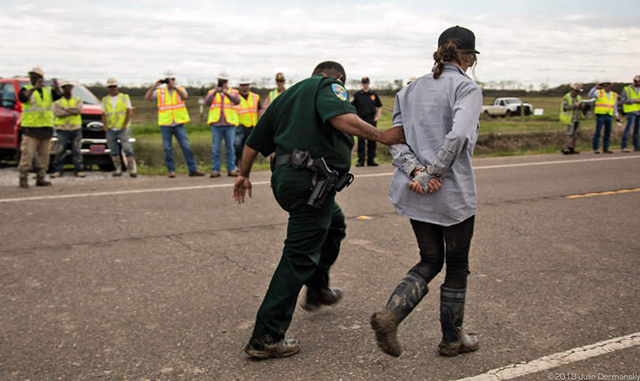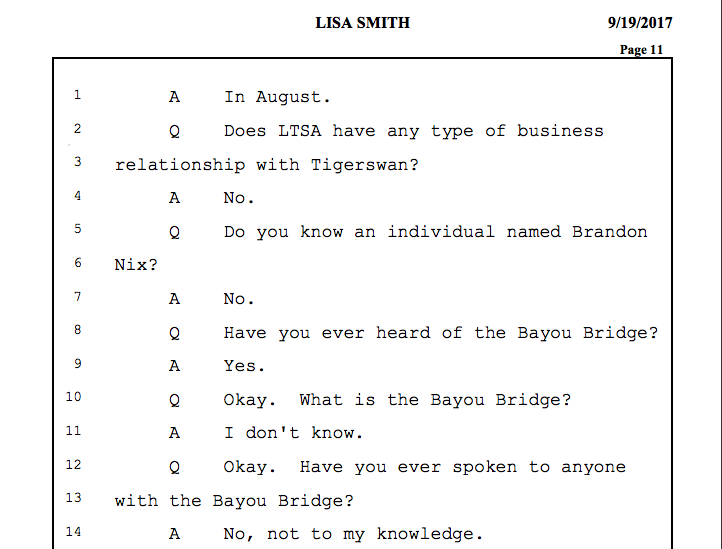
Did you know that Truthout is a nonprofit and independently funded by readers like you? If you value what we do, please support our work with a donation.
The private security firm TigerSwan, known for its controversial military-style tactics against Dakota Access pipeline protesters, is appealing the decision to deny its application for a license to operate in the state of Louisiana, where Energy Transfer Partners is building the Bayou Bridge pipeline. In November, several environmental groups opposed to the Bayou Bridge pipeline attempted to intervene in this case, saying their members were particularly vulnerable to TigerSwan’s security and surveillance practices should it be allowed to operate in support of that oil pipeline, but today the Louisiana State Board of Private Security Examiners denied this request.
However, during this process, it came to light that the state board denied another security license application from a TigerSwan employee who failed to disclose her employment with the firm after TigerSwan’s application was rejected.
The board’s deposition of this employee, obtained via a public records request, was included in the request to intervene in TigerSwan’s case by 350 New Orleans, Atchafalaya Basinkeeper, Gulf Restoration Network, L’eau Est la Vie (“Water Is Life”) Camp, Louisiana Bucket Brigade, and Louisiana Crawfish Producers Association-West.
“Given its track record, TigerSwan should not be allowed to come into Louisiana and use their military-style tactics to hinder the right of ordinary Louisianans to exercise their First Amendment rights,” Pamela Spees, attorney with the Center for Constitutional Rights, who is representing the groups, said in a statement. “The board did the right thing in denying them a license.”
TigerSwan Employee Tries to Set Up New Security Firm in Louisiana
Part of the reason the board cited for rejecting TigerSwan’s case on July 17, 2017 was “they were denied licensure twice in [North] Dakota and are pending litigation,” according to the board’s executive director Fabian Blache III.
TigerSwan is being sued by the North Dakota Private Investigation and Security Board for allegedly performing security work in the state without a license during and after the Standing Rock protests against the Dakota Access pipeline.
On September 19, 2017, the Louisiana board deposed TigerSwan employee Lisa Smith, who had applied for a license to operate her brand-new private security firm, LTSA, LLC, in Lafayette, Louisiana. While she originally said she opened the company office in August, later in the deposition Smith corrected this to say it was actually July — the same month that TigerSwan’s application was rejected. Louisiana state records indicate that LTSA, LLC was registered on August 3, 2017.
In her license application, filed August 4, Smith, a resident of North Carolina, where TigerSwan is also based, submitted a resume which did not disclose her contemporaneous employment with TigerSwan.
Instead, she listed her employer as “Metlife MSOC,” which is the security operations center where the firm had contracted her to work. In the September deposition, she confirmed that TigerSwan paid her salary but that she reported for work at Metlife.
 In Lisa Smith’s deposition on September 19, 2017, she denies her company LTSA was set up in relation to TigerSwan’s denied license to operate in Louisiana.
In Lisa Smith’s deposition on September 19, 2017, she denies her company LTSA was set up in relation to TigerSwan’s denied license to operate in Louisiana.
During the deposition, the board asked Smith whether or not she had ever listed TigerSwan as her employer on her LinkedIn profile. She answered that she did not remember.
However, the board supplied an email with a screenshot of a Google search result showing a cache of her LinkedIn profile, which listed her as a “Watch Officer at TigerSwan/Metlife SOC.” Her current LinkedIn profile does not list her employment with TigerSwan, and while during the deposition Smith said her Metlife contract was already expired in September, her profile continues to list “Metlife-MSOC” as her present employer.
When asked by the board about why she decided to open a security firm in Louisiana, Smith replied: “The opportunities were good.” However, she denied LTSA had any connection with TigerSwan and its failure to secure a license in the state, and further said that while she had heard of “Bayou Bridge,” she said she did not know what it was or whether she would consider applying for work related to it in the future.
Smith also denied knowing someone named Brandon Nix. According to Blache, the state board’s executive director, Nix was the agent who originally applied for TigerSwan’s license in Louisiana.
“We later learned that he was the person liaising with Lisa Smith’s registers office site to secure the keys to the property leased by her company LTSA,” Blache told DeSmog via email.
 In Lisa Smith’s deposition, she denied her new security company, LTSA, had any connection to her employer TigerSwan.
In Lisa Smith’s deposition, she denied her new security company, LTSA, had any connection to her employer TigerSwan.
The board turned down Smith’s request for a license on October 4, 2017. “Denial was based on material misrepresentations in the application and during the State Board deposition,” said Blache.
TigerSwan had two lawyers representing the firm present during Smith’s deposition. It is not currently employed by Energy Transfer Partners to do security work related to the Bayou Bridge pipeline, a 162-mile-long project which will carry to Gulf Coast refineries oil originally drilled in North Dakota. So far, that security work has been performed by the firm Hub Enterprises.
Neither Lisa Smith not TigerSwan responded to multiple requests for comment.
TigerSwan Connections in Louisiana
Even before the Louisiana board rejected TigerSwan’s application, the private security firm already appeared to be working its connections to the Bayou Bridge pipeline.
In February 2017, retired Major General James “Spider” Marks testified in support of this pipeline at a Louisiana Department of Natural Resources permit hearing and published an op-ed endorsing it in a local newspaper. In neither of these instances, however, did Marks disclose that he was chair of TigerSwan’s advisory board, not unlike the way Smith also failed to share her ties to the firm. (Marks is no longer listed on TigerSwan’s website.)
This seems to be a trend for Marks, who has a history of appearing on TV as a military pundit without disclosing his ties to military weapons companies.
TigerSwan appears determined to succeed in gaining access to perform security work in Louisiana.
As Julie Dermansky has previously reported for DeSmog: “A few days after TigerSwan’s permit was denied in Louisiana, the company filed an appeal and hired five lobbyists who work for the lobbying firm Southern Strategy Group.”
The firm is currently awaiting a hearing with the Louisiana State Board of Private Security Examiners appealing its denied application.
Louisiana Proposes Harsher Punishments for Pipeline Offenses
With implications for future protests against the Bayou Bridge pipeline, this week the Louisiana State Legislature introduced House Bill 727, which proposes as a criminal offense the “unauthorized entry of and criminal damage to a critical infrastructure.”
The bill seeks to include oil and gas pipelines and their construction sites among the definition of “critical infrastructure.” For those convicted of damaging this infrastructure when a threat to human life is “foreseeable” or the action “disrupts” the infrastructure’s operations, the bill stipulates a sentence of imprisonment and hard labor for between six and 20 years, up to $25,000 in fines, or both.
It also includes separate “conspiracy” charges, with similar criminal penalties, except that the maximum possible fine is $250,000. The bill both amends the Louisiana criminal code, which currently deals only with “unauthorized entry of a critical infrastructure” and creates the new crimes for damaging those facilities and conspiring to either illegally enter or damage them.
Several other states, including Wyoming, Iowa, and Ohio, have introduced similar laws in recent months which would criminalize the type of activities of past oil and gas pipeline protesters. Oklahoma already passed into law parallel legislation which has served as a template for other state proposals.
Some state lawmakers have specifically cited the Dakota Access pipeline protests as inspiration for these “critical infrastructure” bills and likened actions by pipeline protesters to “terrorist activities.”
A terrifying moment. We appeal for your support.
In the last weeks, we have witnessed an authoritarian assault on communities in Minnesota and across the nation.
The need for truthful, grassroots reporting is urgent at this cataclysmic historical moment. Yet, Trump-aligned billionaires and other allies have taken over many legacy media outlets — the culmination of a decades-long campaign to place control of the narrative into the hands of the political right.
We refuse to let Trump’s blatant propaganda machine go unchecked. Untethered to corporate ownership or advertisers, Truthout remains fearless in our reporting and our determination to use journalism as a tool for justice.
But we need your help just to fund our basic expenses. Over 80 percent of Truthout’s funding comes from small individual donations from our community of readers, and over a third of our total budget is supported by recurring monthly donors.
Truthout has launched a fundraiser to add 432 new monthly donors in the next 7 days. Whether you can make a small monthly donation or a larger one-time gift, Truthout only works with your support.